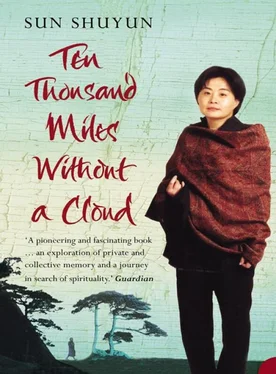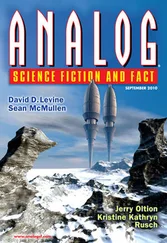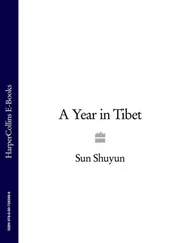But Xuanzang was far from content. The more he studied, the more dissatisfied he felt. Chan masters, or Zen as the world now calls the school, would tell him that we all had in us the purest, unspoiled mind, the Buddha-nature, but it was defiled by erroneous thoughts; if only we could get rid of them, we would experience awakening. This could happen any time, at any place – while you were drinking tea, hearing a bell ring, working in the field, or washing your clothes. But Zen placed much emphasis on meditation that enabled one to go beyond logic and reason, the stumbling-blocks to enlightenment. How do you get a goose out of a bottle without breaking the bottle? This was the sort of question, or koan , that Zen masters would ask their disciples to jolt them out of their analytical and conceptual way of thinking, and to lead them back to their natural and spontaneous faculties. Reciting the sutras – the teachings of the Buddha – and worshipping his images were no use at all. As a famous Zen master said, ‘If you should meet the Buddha, kill the Buddha.’
But Xuanzang was told by masters of the Pure Land School that practising Zen was difficult and laborious, like an ant climbing a mountain. Instead he should simply recite the name of Amitabha Buddha, who presided over the Pure Land of the Western Paradise. The Bodhisattva of Compassion, Guanyin, is his chief minister. Often portrayed in Chinese temples with ten thousand hands and eyes, Guanyin is ever ready to go anywhere and lead the faithful to the land of purity and bliss. Once there, in the company of Amitabha, anyone can swiftly achieve enlightenment. Guanyin became Xuanzang’s favourite deity and he would pray to her whenever he was in difficulty. She was also Grandmother’s favourite, and that of all Chinese Buddhists.
The followers of the Tiantai School, based in the Tiantai Mountains in eastern China, claimed, however, that they had found the true way. Buddhism was introduced into China in the first century AD and with the help of Indian and Central Asian monks, most of the major sutras had been translated into Chinese by Xuanzang’s time. The Tiantai School made the first comprehensive catalogue of the large number of sutras and synthesized all the various thoughts and ideas. They came to the conclusion that the entire universe was the revelation of the absolute mind, that everyone possessed the Buddha-nature, and that all truth was contained in the Lotus Sutra alone. You could forget about all the others.
Xuanzang never ceased to examine the different schools, but he told Hui Li that despite all his efforts, he was never free from doubts. Each of the schools claimed to know the quickest way to enlightenment, but he found them wildly at odds with each other. Was it because the sutras they read were in different translations? The early Indian and Central Asian monks did not speak Chinese and the sutras they had translated were not always accurate. But what troubled him even more was whether all the schools were authentic. The Chinese were very practical and down-to-earth, not given to abstract concepts and metaphysical speculation, and had no time for abstruse doctrines and convoluted logical debates. This was why they preferred the instant enlightenment of Chan or winning a place in paradise through recitation. It seemed all too easy. Xuanzang knew well that the Buddha’s path to enlightenment was long and arduous. He was far from sure that everyone had the Buddha-nature, and he could not believe enlightenment was to be reached without fundamental understanding of the nature of reality and the mind.
Xuanzang decided to go back to Chang’an where the head of the rebels, Li Yuan, had crowned himself the emperor in 618 and established a new dynasty, the Tang. He thought he might find some masters there who would help him clear the doubts in his mind. He was particularly keen on Yogacara, the most abstract and intellectual school of Buddhism which held that everything in the world was created by the mind. But no one could shed light on it. His brother did not want to leave: they had already acquired a reputation for themselves and he thought they should stay put. So without telling him, Xuanzang left with some merchants.
Back in the capital, he studied with two masters ‘whose reputation spread beyond the sea and whose followers were as numerous as the clouds’. But even their interpretations differed and he told Hui Li that he was at a loss to know whom to follow. One day he met an Indian monk, who told him that Yogacara was very popular in India, particularly in Nalanda, the biggest monastic university. Xuanzang’s interest was aroused. He had long sensed there was a vast ocean of Buddhist wisdom, which he could perceive only dimly. A pilgrimage to India would give him direct knowledge of Buddhism and clear all his doubts. Once he set his mind on the journey, he started making preparations: taking Sanskrit lessons from Indian monks, gathering information about the countries along the way from the Silk Road merchants in Chang’an, reading accounts of early pilgrims to India, looking for fellow-travellers, and exercising to make himself fit. Meanwhile he sent a request to the imperial court for permission to go abroad, but in vain. There was a coup in the imperial palace: the young Emperor Taizong had just come to the throne after killing his brothers and forcing his father to abdicate. People were not happy; there was the threat of more rebellions. Everything was in flux and nobody was allowed to travel.
But Xuanzang had to leave, imperial approval or not. One day he had a dream in which he saw Mount Sumeru, the sacred mountain at the centre of the universe in Indian and Buddhist mythology. It was surrounded by sea but there was neither ship nor raft. Lotus flowers of stone supported him as he crossed the waters, but so slippery and steep was the way up the mountain that each time he tried to climb he slid back. Then suddenly a powerful whirlwind raised him to the summit where he saw an unending horizon. In an ecstasy of joy he woke up; he believed he had been shown a vision of what he must do – he must go to India and learn the teaching of the Buddha at its source.
I returned again and again to reading about Xuanzang. It was as if a new person was entering my life, someone to whom I was strongly drawn, wise and calm, brave and resourceful. He did go to India, but on his own, with no magical protector. The more I learned about him, the more extraordinary I found him, and the more puzzled I was. Why had I known so little about him? After all, my education was full of the emulation of one hero after another. What was it that had kept him away from me, and from most Chinese? I had to find out. I had to separate fact from fiction. Gradually I realized all the clues were in my own family. Only I was part of it, and could not see them.
My father was an ardent Communist. He joined the People’s Liberation Army in 1946, when he was sixteen, and marched from northern China to the southern coast, helping to bring the whole country under Communist control. Then he saw duty in Korea for eight years. In the process, he joined the Communist Party, rose through the ranks and became a firm believer in Marx, Lenin and Chairman Mao. When he came back from Korea in 1958, he divorced the wife arranged by his parents, and fell in love with and married my mother, a beauty twelve years his junior.
My maternal grandmother was a Buddhist, the only one in our family. Most men and women of her generation believed in Buddhism one way or another. Mao’s own mother did, and under her influence the young Mao worshipped the Buddha too, even attempting to convert his father. Ever since Buddhism spread to China in the first century AD, it had struck a chord in the hearts of the Chinese. They had their indigenous beliefs, Confucianism and Daoism. While Confucianism emphasized the order and harmony of society where everyone had their place, with the emperor at the apex, Daoism concentrated on the search for the eternal, unchanging nature that unifies the individual with the universe, with the ultimate goal of achieving immortality in this world. Neither said anything about the question most of us wanted answered: what would be waiting for us after we departed from this world? The Buddhist doctrine of karma and paradise allayed Chinese anxieties about the afterlife, and satisfied their desires for longevity, for justice, and also for compassion. In the end, in this land already possessed of a long history and strong culture of its own, Buddhism adapted, survived and blossomed, despite opposition and frequent persecution.
Читать дальше












